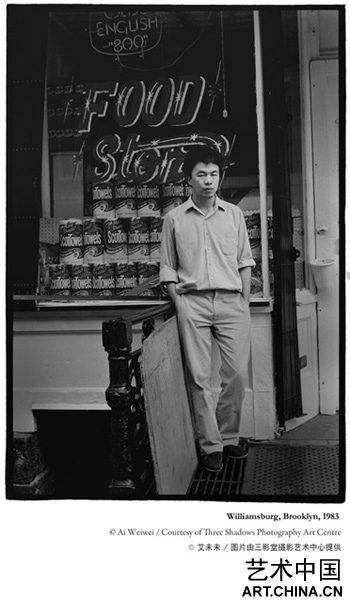|

艾未未:紐約1983-1993
地點:三影堂攝影藝術中心 中國北京草場地155號A
開幕:2009年1月2日下午3點
展覽時間:2009年1月2日——4月18日,10:00-18:00(法定假日及每周一休息)
2009年1月,三影堂攝影藝術中心將舉辦“艾未未:紐約1983-1993”攝影展,展出艾未未于20多年前拍攝的、之前從未發表過的作品。從一萬多張照片中精心挑選出的這些作品,以艾未未對社會和藝術的獨特視角,折射出整個80年代的歷史、文化和氛圍。
這些作品展現了艾未未眼中1980年代的紐約,形形色色的社會生活、藝術活動、他身邊的人和事,不僅記錄了一個時代的變化,而且揭示了透過艾未未的眼睛所看到的世界,追蹤他觀念藝術實踐的起點。
作為一位重要的中國當代藝術家,艾未未以其雕塑、裝置和建筑而聞名,但攝影在他的藝術創作實踐當中也發揮著重要的作用。他對攝影有著獨到的見解,也曾經用攝影來創作藝術作品。
這些照片是對他自己的生活和工作所作的紀錄,帶著那個時代特有的烙印。它們并不是艾未未整個生活的編年史紀錄,而是紀錄了他周圍的場景,揭示了他當時的思考和態度。無論對他個人而言,還是就當代藝術來說,這些照片是一部珍貴的視覺歷史。
作者的話:
這些照片,是我在紐約1983年至回到北京的1994年拍攝的,前后十年的時間。那時我沒有什么事情可做,總是閑著,隨手拍了一些遇見的事,去過的地方,熟悉的人,我的周圍的住地、街道和城市,打發每天的閑散時間。
一晃20年過去,紐約已經不是當年的紐約,下東城的東村的面貌全變,照片中的很多人已經不在世,當年常在一起的人,也早已面貌全非,不再親近往來,不再是朋友,各奔東西。這里所涉及的人,大多并不知道有這些照片存在。今天,平淡的面對過去,它們都不再真實。既確定而又不真實,畢竟任何的現實都是變化中的事實,是漫長的時間中不確定的片刻,現在總是覆蓋著過去,未來也不將理會今天。
我陸續整理出一些照片,不是為了記憶,它不重要,那段走過來的路,不必是那一條,也可能走向另外一方。那些曾認識的人,也大可不必認識,人性本身孤獨,一起時或許快樂溫暖,之后想起來難免可疑。我整理它們,是因為這些圖像本身始終是一個真實的物質存在,那些游離在相紙上的化學物質固定一處,不再游離,在黑暗中形成了秩序。它們在我這里,它所涉及的人和事件,包括我的過去,早已不重要了。
生活在過去的50年中,很像是一片落葉,沒有目的沒有方向,但最終還是會落在某個角落。圖片出現的方式和秩序也會是如此,雜亂無章的,有些思路好像只有混亂時才可以清晰。
今天我依然手不離相機,習慣性的按下快門。應該說明的是,我既無興趣于攝影,也不太在意所拍之物,它始終是與我的存在并行的另一個現實,每當再看到這些照片,總是發現陌生感大于熟悉感。
整理和保存這些作品,對于三影堂呈現中國攝影歷史這一使命而言是至關重要的。早在三影堂攝影藝術中心成立之先,創辦人榮榮和映里即已開始與艾未未探討這批照片的展覽與出版。
“艾未未:紐約1983-1993”展覽將持續到2009年4月。
三影堂攝影藝術中心
北京朝陽區草場地155號A
電話:+86 10 6432 2663 / 6431 9063 / 6431 9693
網站:www.threeshadows.cn
Ai Weiwei: New York Photographs 1983-1993
Location: Three Shadows Photography Art Centre No. 155A Caochangdi, Beijing, China
Opening: January 2nd, 2009 3pm
Exhibition Dates: anuary 2nd to April 18th, 2009, 10am to 6pm (closed on Mondays and national holidays)
This January, the Three Shadows Photography Art Centre will open ‘Ai Weiwei: New York Photographs 1983-1993,’ an exhibition of the artist’s unpublished photographs. The pieces in this exhibition were chosen from a collection of over 10,000 photographs that capture the history, culture, and atmosphere of 1980s New York from Ai Weiwei’s unique perspective on art and society.
There are photographs of East Village poetry readings, riots in Tompkins Square Park, drag queens from Wigstock, and visits by well-known artists and writers from China. The photographs not only document the changes of an era, but also reveal the world as seen through Ai Weiwei’s eyes and trace the beginnings of his conceptual art practice.
An important Chinese contemporary artist, Ai Weiwei is well known for his sculptures, installations, and architecture. Yet photography also plays an important role in his art practice. He has a distinct understanding of photography and has created some of his most iconic artworks with photographs.
The New York photographs are records of his life and work, which carry the stamp of that time. They are not a perfect chronicle of Ai Weiwei’s life, but rather scenes taken from his surroundings that reveal his thoughts and attitudes at the moment. The photographs are a valuable piece of visual history for both him personally and contemporary art.
Ai Weiwei on the New York photographs:
These photos were taken between 1983 and 1994 during the decade I spent living in New York before returning to Beijing. At that time, I didn’t really have anything to do. I was just hanging out, whiling away my time everyday by taking pictures of the people I met, places I went, my friends, my neighborhood, the street and the city.
In a flash twenty years have past, and the New York I knew no longer exists. The appearance of the East Village has totally changed, and many of the people in my photographs are no longer in this world. I took these photos casually, and most of my subjects probably don't even realize that they are in them. Today, looking back on the past, I can see that these photographs are not true anymore. After all, any reality is just a fact of change – an unconfirmed moment in the slow march of time. The present always surpasses the past, and the future will not care about today.
What drives me to organize and publish these photographs is not nostalgia, for I believe that past occurrences do not matter much. We are not destined to meet those whom we’ve met, and humans are by nature lonely. Rather, the photos themselves are concrete objects that form a kind of orderly arrangement despite their free-floating nature as disassociated images on photo paper. The specific people and things involved, including my own past, are not important anymore.
Life in the past fifty years has been much like a falling leaf with no goal or direction. In the end, however, the leaf will land in some corner. The images’ appearance and order are much like this. They are disorganized, but paths of thought appear that seem most clear when the photos are all mixed up.
Today, I still always have a camera in my hand, accustomed as I am to the click of the shutter. What I should explain though, is that I am not that interested in photography, and don’t really care about the subjects of my photos. In the end, they are part of a different reality than that of my own existence. Every time I look at these photographs, I always discover that there is more strangeness in them than familiarity.
Archiving and preserving this collection is central to Three Shadows’ mission of presenting the history of Chinese photography. Long before Three Shadows opened, founders RongRong and inri began collaborating with Ai Weiwei on the exhibition and publication of these photographs. Three Shadows has organized and digitized the entire archive of Ai Weiwei’s early photographs.
‘Ai Weiwei: New York Photographs 1983-1993’ will be on view through April 2009.
Three Shadows Photography Art Centre
No. 155A Caochangdi, Chaoyang District, Beijing
+86 10 6432 2663 / 6431 9063 / 6431 9693
www.threeshadows.cn
|

